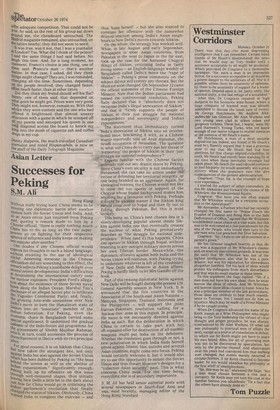Westminster Corridors
Monday, October 21 There was this day the most depressing intelligence that I can remember. Certain hired friends of Mr Heath's disseminated the news that he would stay as Tory leader until a successor acceptable to all might be produced. Which provoked Dr Cosgrave to a memorable harangue: "Sir, such a man is an impossible fiction, for a successor acceptable to all would be a potent danger to the ambitions of all. Nor is it possible, unless there be unanimity of opinions, for there to be unanimity of support for a leader of opinion. Depend upon it, Sir, party unity, like national unity, is the last refuge of a scoundrel."
After this, Dr Cosgrave repaired in high dudgeon to his favourite wine-house, where a large company of learned men was already assembled to discuss the latest turn of events: Mr George Hutchinson, Mr Andrew Alexander, Mr Ian Gilmour, Mr Alan Watkins and two young men clad in silken robes and gorgeous turbans. These last, I learnt, were My Lord Hartwell's Young Turks, who yet knew enough of our native tongue to mutter menaces at the mention of Mr Heath's name.
Mr Hutchinson, a man of a most amiable disposition (as, indeed, any friend of Mr Heath's must be), fluently argued that it was a grievous error to say that Mr Heath had lost four elections, for that charge implied culpability. In truth, Mr Heath had merely been standing by at the time when these inevitable reversals had taken place. Mr Heath (he said) should continue to lead his party: he would assuredly win a great victory when the populace saw the dire consequences of the present administration.
Cosgrave: "That, Sir, is the triumph of hope over experience."
I started the subject of other contenders. At this Mr Alexander put forward the claims of Mr Whitelaw, the Westmoreland Squire.
Cosgrave: "But have you not often argued that Mr Whitelaw would be a veritable invitation to the Apocalypse?"
Mr Alexander, a Puritan who had but recently changed his first name to "Praise Enoch the Prophet of Disaster and Bring Him to the Safe Deliverance of Office," agreed that Mr Whitelaw would indeed cause chaos on a vast scale, but this was to be welcomed as a just punishment for the sins of the People, who would then turn to the one man who had preached the True Salvation. Cosgrove: "Sir, I hate to see an economist in a parson's gown."
Mr Ian Gilmour laughed heartily at this. He too was a supporter of Mr Whitelaw's claims; and, on scarcely less curious grounds. It was true (he said) that Mr Whitelaw was not of the highest intelligence; also that he was a poor debater; nor was his reputation for shrewdness altogether justified. Yet his lack of ideas would protect his colleagues from much disturbance and that was no small matter in these times.
To this argument the Sage replied: "Sir, if a man does not have his own ideas, then he must borrow the ideas of others. And Mr Whitelaw will borrow those ideas closest to hand. Since he was a principal member of the last government, those ideas are unlikely to bear much resemblance to Toryism. Yet I would not do him an injustice. Much may be made of a Prime Minister if he be caught young."
When Dr Cosgrave advanced the name of Sir Keith Joseph as a Wise Philosopher who might bring to the Tory leadership the virtues of clear thought and proper prejudice, he was sharply contradicted by Mr Alan Watkins. Of what use was philosophy to practical men of affairs (he said), except as a source of consolation in defeat, to which use Sir Keith might yet have to place his own brand. Also, the art of governing men Was not to be discovered by speculation, but only by the practise thereof. And observation over the years had convinced him that nothing ever changed, but events merely recurred in circular fashion. If Sir Keith chanced to become leader, he too would abandon his philosphy at the first whiff of unemployment. "Sir, this may be so," answered the Sage, "but a man must choose between a risk and a certainty. Sir Keith may yet turn his coat in the familiar fashion you adumbrate. 'Tis a fact that the others have already done so."
Tom Puzzle










































 Previous page
Previous page